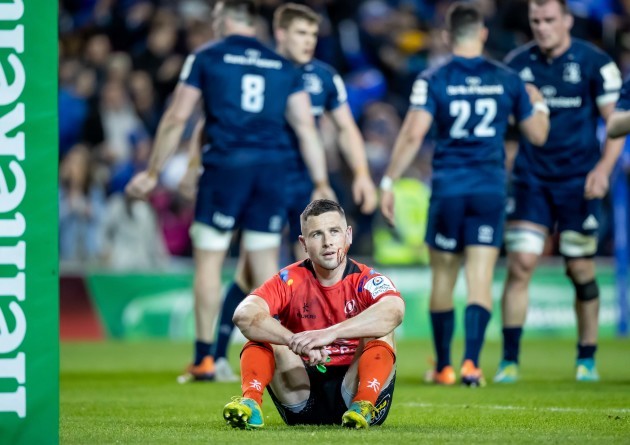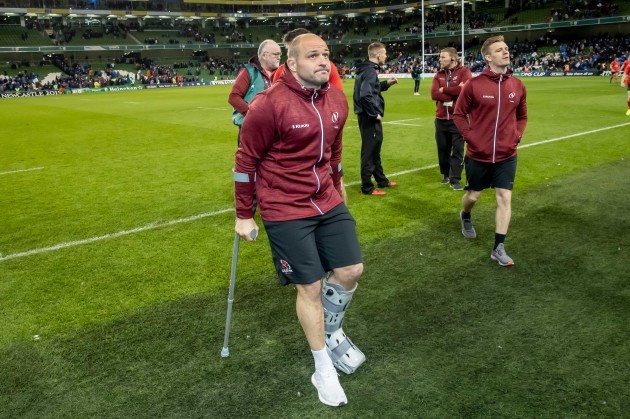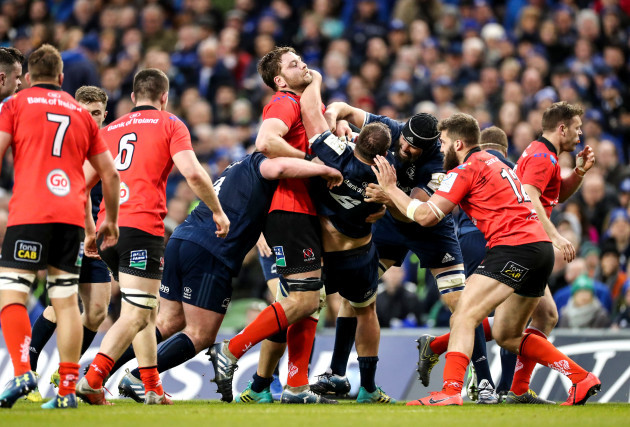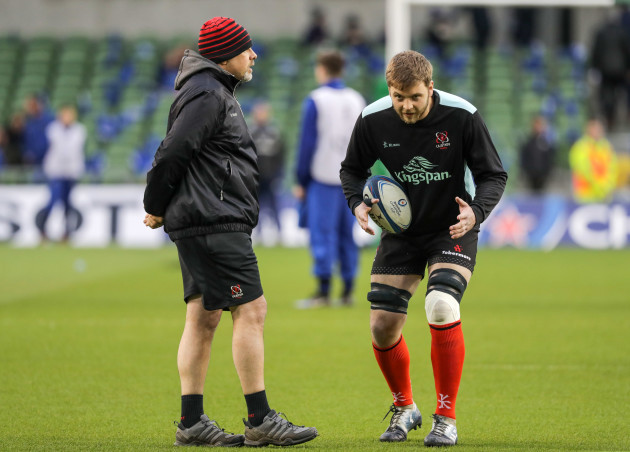Sean Farrell reports from the Aviva Stadium
IT MAY BE difficult to escape the sense of missed opportunity about Ulster’s first European Cup quarter-final since that arduous duel with Saracens in 2014.
And yet this was a performance that will act as a warning shot for future opponents and the Ulster faithful alike, proof that Ulster have their act back together and are capable of challenging any team.
Anywhere too. Not just on a feisty Friday night in Ravenhill.
For such a long stretch yesterday evening, Ulster gave the reigning champions a real fright that their defence might see an early end. Meanwhile the northern province grew with each skirmish win as they all were added to a confidence stockpile built with victories at this very venue in 1999 and 2012.
In the end, be it thanks to Jacob Stockdale’s first truly high-profile error, John Cooney’s missed conversion or just Leinster’s big-game muscle memory, the champions found a way to survive and advance to the semi-finals.
Ulster are left to focus on the Pro14 for what’s left of the season, yet this performance was a sign that the dials are pointing in the right direction all around the Kingspan Stadium.
Dan McFarland is in his first year as a head coach, but his impact is unquestionable. Les Kiss’ dismissal early last year marked a low ebb for the club. And while the Australian certainly wasn’t the root of the issue, McFarland’s fresh and uncompromising voice has allowed the red hand to become a clenched fist once more.
Iain Henderson was always going to be a man who could pull Ulster closer to parity with Leinster on an occasion such as this, but he lamented the absence of one or two higher gears when the game was in the balance.
“That next level just got away from us a wee bit,” said the Lions lock, “but, pretty proud of the guys who have worked the whole season to get to that point to be able to take those steps towards that goal.
“We know ourselves that ultimately we didn’t take it. Pleased with a lot of stuff we did but we know there’s a lot of work-ons out there – Dan mentioned about making sure we’re getting players to contact a wee bit quicker in that first half.”
On a list of ‘what-ifs’, the early departure of Rory Best ought to be considered another possible turning point. The Ireland captain is coy about his provincial future, but it is possible that his 75th European appearance will be his last. What a shame, and yet in some way fitting of his warrior mindset, that he would end up on crutches after both of Ulster’s most recent quarter-finals.
Iain Henderson noted how his skipper had looked around the dressing room and pointed out that there was no shortage of young men who can be counted as long-term options in an Ulster gameplan.
John Cooney is 28 and has made a mockery of all that Ulster discontent which preceded his arrival by becoming a suped-up version of Ruan Pienaar. Stockdale – the star who helped propel them to this point with such a sensational try against Racing before putting himself in the firing line for criticism for yesterday’s loss – was the old man of the back three last night, while 20-year-old Mike Lowry and 21-year-old Robert Baloucoune showed plenty of quality for the here and now, never mind future promise.
Darren Cave is 31, but is proving himself to be one of those players who refuses to let experience count as a negative. Despite a tender rib, he led a ferocious line-speed that left Garry Ringrose suffocated in his favourite arena.
Eric O’Sullivan, Kieran Treadwell (both 23), Marcell Coetzee, Jordi Murphy (both 27) and Marty Moore (28) have no shortage of miles left on the clock and can form the basis of a pack for years to come.
“Rory touched on it there in the dressing room,” recounts Henderson, “we have a very young squad; average age way down in the low 20s.
“A lot of the lads haven’t been in changing rooms like this, but for them to get to playoff rugby in a lot of their first seasons of professional rugby – not even just their first season with Ulster – I think that is massive.
“It’s a massive boost of confidence for them. That’s their baseline now and what they want to step forward to and build towards.
That is something I’m sure they’ll use, internally, to drive them on. Not only for the next six to eight weeks, but going on for the rest of their careers.”
Henderson too is part of that 27 club and will have an enormous role to play if Ulster are to consistently challenge at this level in the coming years. However, he won’t bring himself to say last night’s performance signalled the start of something for a new Ulster team. The men in their 30s played too big a role to be dismissed so lightly.
“Darren Cave or Rory Best, it’s no starting point for them,” he laments before suggesting there is some symbiosis at play between young and old.
“They’re revitalised by a lot of the young lads coming through… it’s been a very fresh lift seeing the young lads coming in and seeing the competition they’re putting on a lot of the older players, a lot of the guys who have been around for a few years, it’s class to see.
“It’s brilliant. The enthusiasm they bring to training every week. It’s massive on weeks where you might be feeling down or you might be feeling it’s not going your way, the young lads are definitely adding energy.
“Not only on the pitch, not only on the training pitch but almost in every aspect.”
Improvements will come with experience for some, and improvements are certainly needed if Ulster are to successfully navigate matches like this. Adam Byrne’s try came about because of a crucial laps in concentration from a pillar and Jack Conan accepted the invite.
They could have done with more range from Billy Burns to ease the game management pressures on Cooney and another hard-nosed back row would go a long way in the back row.
The first-year coach isn’t doing too badly though. McFarland began his time in front of the gathered press by hitting off a broad question about the match’s turning point with a note on Stockdale’s supreme ability and a commendable effort to bring blame off the 22-year-old’s shoulders and onto his own. But he left too steep a cliff-hanger in Friday’s pre-match press conference not to take some credit for the tactical approach.
All week, Bath’s near miss at the Rec was taken as the template for how to slow Leinster’s rhythm to a stutter and, ultimately, bring a chance of beating them. Before kick-off McFarland was happy to let the question of whether deploying two opensides was the solution hang in the air overnight before instead unleashing lightning-quick line-speed upon Leinster.
Indeed, the ex-Connacht, Glasgow and Scotland forwards coach even suggests that the shape of the plan was in place when Ulster were thrashed 40-7 on their last visit to Dublin in January. The manner of their defeats may have been night and day, but McFarland infers the difference was simply execution.
Leo Cullen won’t thank him for showing Europe there is a second way to skin the big cat.
We knew that our tackle quality had to be absolutely top-notch. I was asked yesterday whether we were playing with two opensides to go after their breakdown. No, that wasn’t our policy. When you look at Leinster and you think about going after their breakdown, you’d have to be really good to get your hands on the ball regularly.
“Bath did it. Could we have done it if we really gone after that? Yes, but then you have to balance the numbers on feet.
“So what we decided was that it was numbers on feet and quality of tackle. But even that is really difficult, when we played Leinster at Christmas, I didn’t think we defended that badly, we had numbers on feet, we worked hard but our tackle quality wasn’t quite good enough.
“As a consequence, they carried hard into us, they got a little bit beyond us, they created fast ball, then you’re always on your heels.
“Whereas today we weren’t on our heels.”




